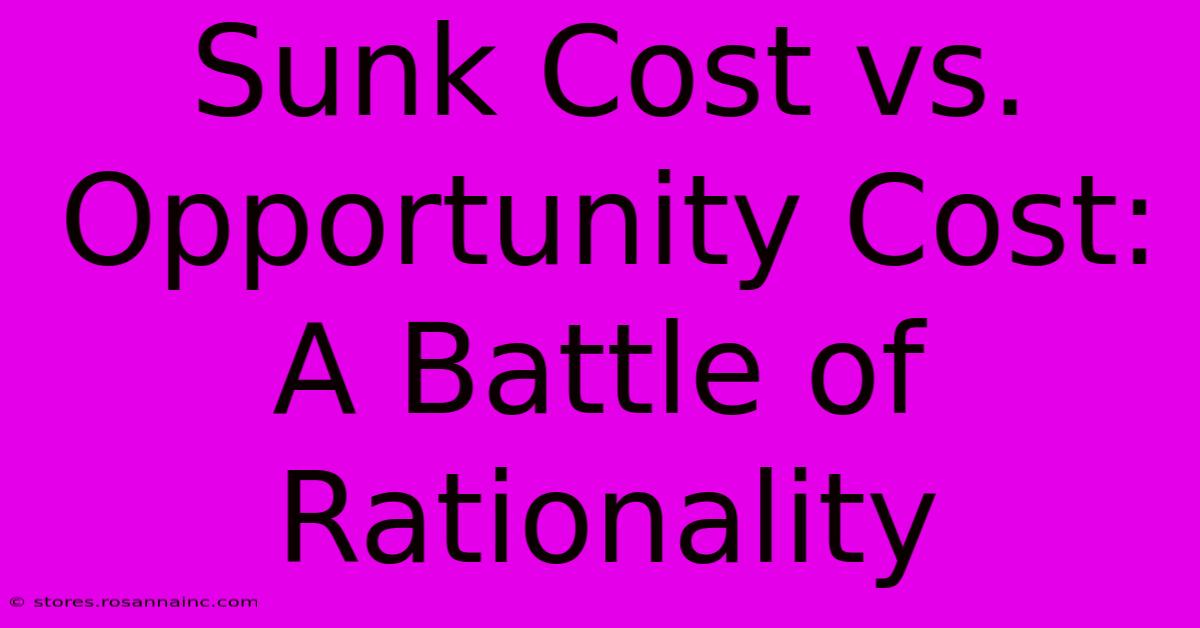Sunk Cost Vs. Opportunity Cost: A Battle Of Rationality

Table of Contents
Sunk Cost vs. Opportunity Cost: A Battle of Rationality
In the realm of economics and decision-making, two crucial concepts often clash: sunk cost and opportunity cost. Understanding the difference and mastering their application is vital for making rational choices, both in personal life and business. This article delves into the intricacies of each, highlighting their distinctions and illustrating their impact with real-world examples.
What is Sunk Cost?
A sunk cost is a cost that has already been incurred and cannot be recovered. It's money spent in the past that's irrelevant to future decisions. Think of it as a cost that's "sunk" – permanently lost. Crucially, sunk costs should not influence future decisions. This is a common pitfall in human psychology, as we tend to justify continuing an investment simply because we've already invested so much.
Examples of Sunk Costs:
- A movie ticket: You bought a movie ticket but find the film boring. The money is gone; staying to "get your money's worth" is irrational. The opportunity cost (see below) of staying is higher than the value of finishing the movie.
- A partially completed project: You've put significant time and effort into a project that's not yielding the expected results. The time and effort are sunk costs. Continuing may lead to further wasted resources instead of cutting your losses and focusing on more profitable ventures.
- A failing business: Despite substantial investments, a business is consistently losing money. Continuing to pour money into it due to past investments is a sunk cost fallacy.
What is Opportunity Cost?
Opportunity cost represents the potential benefits an individual, investor, or business misses out on when choosing one alternative over another. It's the cost of the next best alternative forgone. Unlike sunk costs, opportunity costs are forward-looking and crucial for making rational decisions.
Examples of Opportunity Costs:
- Investing in stocks vs. bonds: If you invest in stocks, the opportunity cost is the potential return you could have earned from investing in bonds.
- Choosing a career: If you choose a career in teaching, the opportunity cost is the potential salary and career progression you could have achieved in another field.
- Spending leisure time: If you spend your weekend relaxing, the opportunity cost is the potential earnings you could have made by working or the personal growth you could have achieved by pursuing a hobby or skill.
The Sunk Cost Fallacy: Why We Make Irrational Decisions
The sunk cost fallacy is the tendency to continue investing in something simply because we've already invested significant resources, regardless of whether continuing is rational. This often leads to poor decisions. We cling to the past instead of focusing on the future.
Avoiding the Sunk Cost Fallacy:
- Focus on future potential: Evaluate the future benefits of continuing vs. the costs.
- Be objective: Don't let emotions influence your decisions.
- Cut your losses: Recognize when something isn't working and move on.
- Consider opportunity costs: What else could you be doing with your resources?
Sunk Cost vs. Opportunity Cost: A Direct Comparison
| Feature | Sunk Cost | Opportunity Cost |
|---|---|---|
| Nature | Past, irrecoverable cost | Future, potential benefit forgone |
| Relevance | Irrelevant to future decisions | Crucial for future decisions |
| Focus | Past investments | Future alternatives |
| Decision Impact | Can lead to irrational decisions (sunk cost fallacy) | Guides rational decision-making |
Conclusion: Making Rational Choices
Understanding the distinction between sunk cost and opportunity cost is paramount for making sound financial and life decisions. By focusing on future potential and considering the opportunity cost of each choice, you can avoid the sunk cost fallacy and make more rational, beneficial decisions. Remember, letting go of past investments doesn't mean failure; it often means making space for greater success.

Thank you for visiting our website wich cover about Sunk Cost Vs. Opportunity Cost: A Battle Of Rationality. We hope the information provided has been useful to you. Feel free to contact us if you have any questions or need further assistance. See you next time and dont miss to bookmark.
Featured Posts
-
The Enigma Of Carmen Marc Valvo Unraveling His Dazzling Empire
Feb 04, 2025
-
Canons Insider Picture Style Strategy For Model Shoots Guaranteed To Impress
Feb 04, 2025
-
Kaleidoscope Of Color The Eclectic Palette Of Pop Culture Phenomena
Feb 04, 2025
-
The Myth Of Objectivity The Unexpected Role Of Self Bias
Feb 04, 2025
-
Flowers That Say I Love You Mom Like No Other
Feb 04, 2025
